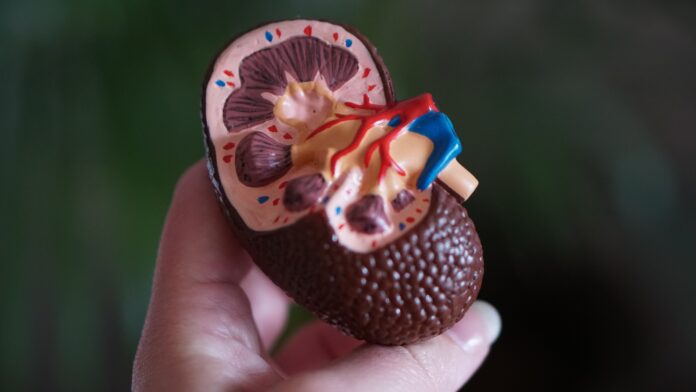
THE adrenal glands are small triangular structures attached to the top of each kidney. The human body has two such glands (also known as suprarenal glands), releasing hormones into the bloodstream. These hormones affect many parts of the human body.
We hear about them a lot, but it feels like we know very little about them. So let’s take a deep dive on our adrenal glands. What they do, why thery’re important, and how to take care of them.
First things first…
Where are my adrenal glands?
The human body has two adrenal glands, one sitting on top of each kidney. Each adrenal gland weighs four to five grams in the average adult. Adrenals are first detected at just six weeks’ gestation.
What do my adrenal glands do?
Each adrenal gland is composed of two distinct parts: the outer part called the adrenal cortex and the inner adrenal medulla.
The adrenal glands secrete different hormones which act as ‘chemical messengers’. These hormones travel in the bloodstream and act on various body tissues to enable them to function correctly.
All adrenocortical hormones are steroid compounds derived from cholesterol. Cholesterol is an essential substance in the production of multiple hormones throughout the body.
What hormones do my adrenal glands produce?
The adrenal cortex produces three hormones.
- Mineralocorticoids: The most important of which is aldosterone. This hormone helps to maintain the body’s salt and water levels which, in turn, regulate blood pressure. Without aldosterone, the kidney loses excessive amounts of salt (sodium) and, consequently, water, leading to severe dehydration.
- Glucocorticoids: Predominantly cortisol. This hormone is involved in the stress response and also helps to regulate body metabolism. Cortisol stimulates glucose production by mobilising amino acids and free fatty acids. Cortisol also has significant anti-inflammatory effects.
- Adrenal androgens: Male sex hormones, mainly dehydroepiandrosterone (DHEA) and testosterone. All have weak effects, but play a role in early development of the male sex organs in childhood, and in women during puberty. These are involved in creating and maintaining the differences between men and women.
The Adrenocorticotropic hormone (ACTH), secreted by the anterior pituitary, primarily affects release of glucocorticoids and adrenal androgens by the adrenal and, to a lesser extent, also stimulates aldosterone release.
The adrenal medulla produces catecholamines, including adrenaline, noradrenaline, and small amounts of dopamine – these hormones are responsible for all the physiological characteristics of the stress response, the so called ‘fight or flight’ response.
Variations
In rare cases, the adrenal glands can become either overactive or underactive. The two main disorders resulting from these are Cushing’s syndrome and Addison’s disease, respectively.
Cushing’s syndrome is due to overactive adrenal glands from excessive production of cortisol. The clinical findings include thinning and bruising of the skin, obesity, diabetes, psychiatric disturbances, high blood pressure, muscle weakness, osteoporosis, excessive facial hair, and irregular periods in women. It can result in growth failure in children. Patients with cortisol excess also have impaired wound healing and an increased susceptibility to infection.
Addison’s disease, or adrenal insufficiency, is due to underactive adrenal glands associated with a lack of hormones. Adrenal insufficiency may be acute or chronic. Acute adrenal insufficiency occurs when an acute stress is superimposed on chronic adrenal insufficiency of any type. Symptoms of chronic adrenal insufficiency include low blood pressure, fatigue, weight loss, anorexia, nausea, vomiting, abdominal pain, salt craving, and low blood sugar. Skin and mucous membranes may show increased pigmentation. The loss of secondary sex characteristics is seen only in women with the disease. Acute adrenal insufficiency is a medical emergency and must be identified and promptly treated. The hallmarks of acute adrenal insufficiency are circulatory collapse with abdominal pain and low blood sugar.
Rarely, overproduction of aldosterone can occur, which causes a condition known as hyperaldosteronism. This causes high blood pressure, which is resistant to conventional blood pressure control tablets, and salt disturbances. High blood pressure may cause headaches and visual problems.
Overproduction of androgens is also rare but may result in excessive hair growth and menstrual period disturbances.
Tumours of the adrenal gland are mostly benign and do not result in over or underproduction of adrenal hormones. Most tumours are discovered incidentally when people undergo scans for various other reasons. Adrenal cancer is very rare. Adrenal tumours may require surgery if they are large or overproduce hormones.
Adrenal care
Given the complex and far-reaching role the adrenals have on maintaining our health, it’s very much in our best interest to take care of them using simple lifestyle factors.
Stress management is one of the key factors we can influence. Incorporate abdominal breathing, avoid mouth breathing, and do regular body scans throughout the day. You might be surprised to find just how much tension you hold throughout your body
Move around. If your stress levels are rising as you scroll through each little thing that pops up on social media, you need an outlet for some of those stress hormones. Movement is a number one choice to complete the stress cycle. That can be whatever you like, jumping jacks, skipping rope, bouncing on a trampoline, walking around the block, or hanging out the laundry.
Sleep deprivation is perceived by your body as a major source of stress and really interferes with well-balanced hormones. Get a routine going that involves settling down and plugging out a while before going to bed, whatever your age. Avoid eating late at night or tackling any challenging situations just before bed, if you can avoid it. Your adrenals will thank you and you in turn should find you sleep more soundly, wake refreshed, and are less susceptible to infections.










